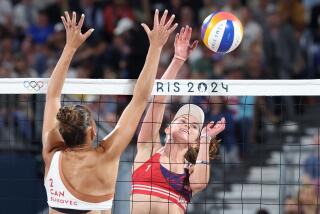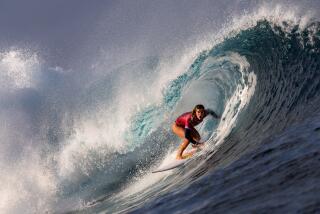ON THE BEACH / MIKE REILLEY : Op Pro’s New Team Format Making Waves With Surfers
- Share via
Newport Beach surfer Richie Collins isn’t shy about anything, and he’s always quick to offer his opinion about subjects ranging from movies to politics to Christianity.
So Collins was quick to share his opinion about the new team-versus-team format at this year’s Op Pro surfing championships, June 23-28 at Huntington Beach Pier.
“The team competition definitely should be interesting,” said Collins, the 1989 Op champion. “But I think they could have done it a better way.
“They should have invited the top 16 surfers in the world and the top 16 in the United States and have a surf-off. I think that would be more interesting than the way they’re doing it.”
Collins, one of the top surfers on the world tour, will be competing for the U.S. team against teams from Hawaii, Australia, Japan, Brazil and Euro-Africa.
Op officials scrapped the individual championship format it has used the past 10 years in favor of the team competition.
The team competition features 30 surfers, including five of the top 11 men on the world tour and three of the top 15 women. The field has been reduced from 160 surfers last year, and many of the top pros, including three-time Op champion Tom Curren and defending champion Barton Lynch, are skipping the event.
The Op Pro is no longer part of the Assn. of Surfing Professionals world tour.
And the new team format was a hot topic among many of the local and world tour surfers at a recent Bud Pro tour contest at Huntington State Beach.
Here’s what they said . . .
Marty Thomas, former Seal Beach resident who will be Team Hawaii’s captain at the Op: “It was bad timing to go to a new format at a time when the ASP tour is going through so many changes. The industry needs to support (the ASP), and I don’t think the public is going to be as enthusiastic about the new format. I could be wrong, and the thing might go off, but the majority of the surfers I’ve approached in the lineup are disappointed and liked the way it was.”
Thomas, a 1990 finalist at the Op, said he would have preferred that Op use the $85,000 purse to attract the top world tour competitors for a four-star qualifying event. With a top-heavy purse, most of the top-seeded surfers would want to compete for the prize money, even if tour points weren’t on the line, he said.
“I’m grateful that Op didn’t drop out completely and is still holding an event,” Thomas said. “I’m in favor of a team competition, but I think it would make a great sideliner event. The Op is like our Wimbledon, U.S. Open or The Masters. It was Southern California’s chance to see guys like Damien Hardman and Lynch. I think you could get a lot of those guys here if you had a qualifier.”
Laguna Beach’s Jeff Booth, who said he wasn’t invited to compete at the Op: “I’m pretty disappointed. All the teams were selected straight off (last year’s) ASP ratings. But when they chose the (U.S. team), they took Todd Holland and Richie Collins, who were ahead of me in the ratings. I should have been third because I was the next one in the rankings. They skipped me and took Kelly Slater, who’s one of the best surfers around, but he wasn’t ranked as high as I was, and Mike Parsons, who they sponsor.”
Mike Parsons, defending U.S. champion and Team Op rider who will be on the U.S. team: “It’s cool because it takes away from the individual competitions we have done in the past. It’s the only time the surfers can get behind each other and support each other. Normally, we all hate each other.
“I think you’ll see some better surfing than normal because there won’t be as much pressure on us. You’ll see guys doing wilder stuff. There’s some mixed reaction, though. A lot of the touring guys are bummed because there are no world tour events in California. But they don’t understand where Op is coming from. I’m bummed that no other companies have stepped forward to have a contest in Southern California.”
San Clemente’s Shane Beschen, points leader on the Bud Pro Surfing tour, who won’t be competing at the Op: “It was weak of Op to change it to a team event. If they don’t have the money to have a world championship event, then they could still have a big, four-star qualifying event.
“You would have more surfers show up that way, and everyone would want to watch them. You want the best guys in it. This way, it’s pretty much just the Op team riders.”
And the winner is: The United States, which is the favorite to take the Op team title.
The U.S. team features Collins, 1990 Op champ Todd Holland, Parsons, young hotshot Slater and Alisa Schwarzstein, a three-time U.S. amateur champion.
Australia poses the biggest threat to the U.S. team, with Op rider Gary Elkerton, former world champion Pam Burridge and Shane Powell.
Hawaii also could be a factor with Thomas, Sunny Garcia and Kaipo Jaquias.
Brazil could be a sleeper with captain Flavio Padaratz, a former Edison High exchange student who’s one of the top competitors on the world tour.
But the Brazilians were dealt a major blow when Victor Ribas broke his leg practicing for the Huntington State Beach contest. No replacement has been announced yet.
The Euro-Africa team features former world champion Martin Potter, but not much else.
Team Japan? Most of its members aren’t familiar with Huntington Beach waves, except for Takao Kuga and Shuji Kasuya. Thomas describes Kasuya’s surfing style as “very similar to Tom Curren’s.”
Although team surfing is new to Southern California, it has been popular in Australia since 1985, when it was introduced in Sydney by surfer Jay Carter.
The team competitions became the standard system in Australian club competitions. They also have been part of world tour contests the past few years in Japan and Europe, usually as specialty events after the individual championships.
Laguna Niguel’s Pat O’Connell participated in a team competition at the Quiksilver Lacanau Pro last year in France.
He teamed with Slater, Ross Williams and Jeff Baldwin, who competed against an Australian team of Powell, Luke Egan, Simon Law and Rob Bain.
“We were a rookie team and we went out there and it was radical,” O’Connell said. “We were out there spanking those guys, our little grommet team against the pros.
“But we wound up losing on the last wave by two points.”
The Op team competition starts on Wednesday (June 24) and lasts through Sunday (June 28). It includes one-on-one, doubles, mixed doubles and tag-team surfing.
In the tag-team competition, surfers are required to catch three waves each in a one-hour time limit. Only one surfer can compete at a time, then run up the beach and tag a teammate. The competition ends when each team has collected 15 waves, or when the hour is up.
Strategy is a big factor, as teams must decide who to match up against opponents. Each tag team is allowed one double-scoring ride, called a “double-whammy.” Rides are scored on a one to 10 scale, with 10 being the top score.
More to Read
Go beyond the scoreboard
Get the latest on L.A.'s teams in the daily Sports Report newsletter.
You may occasionally receive promotional content from the Los Angeles Times.










